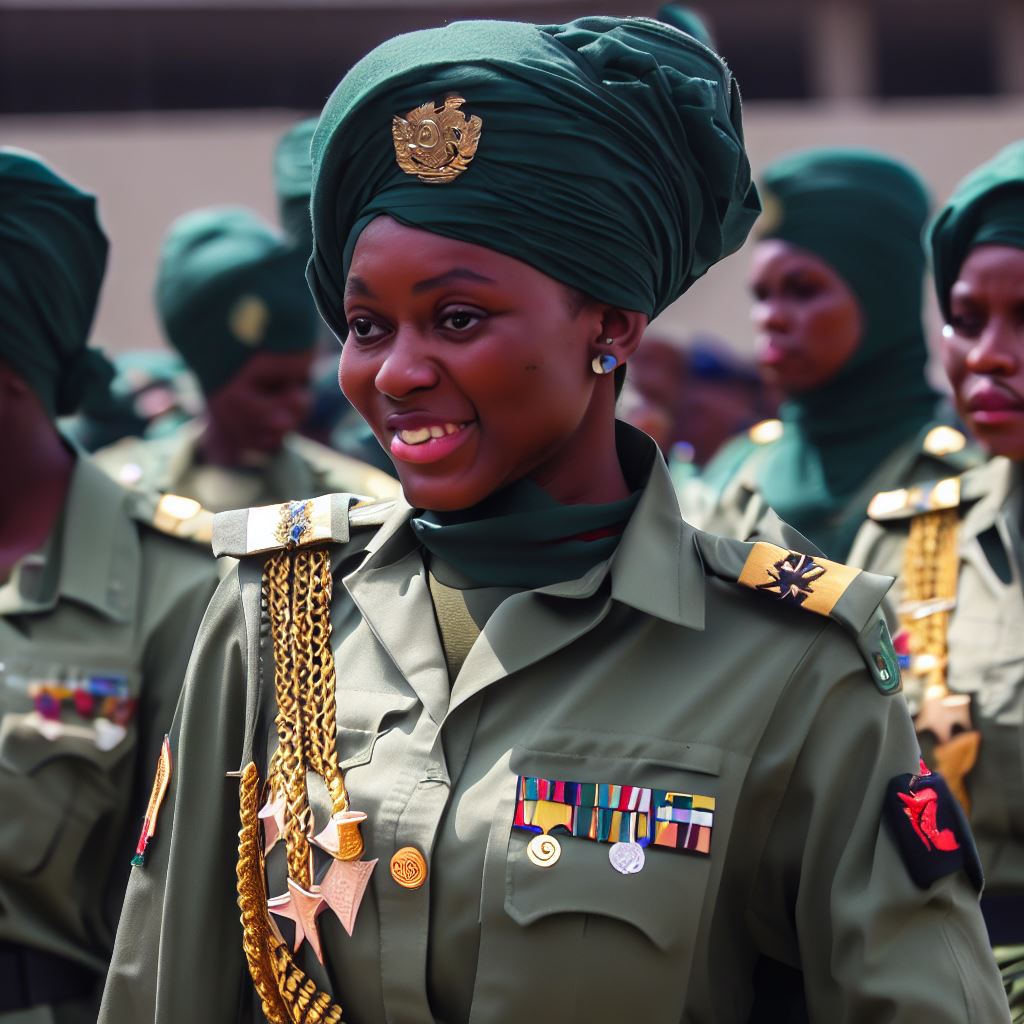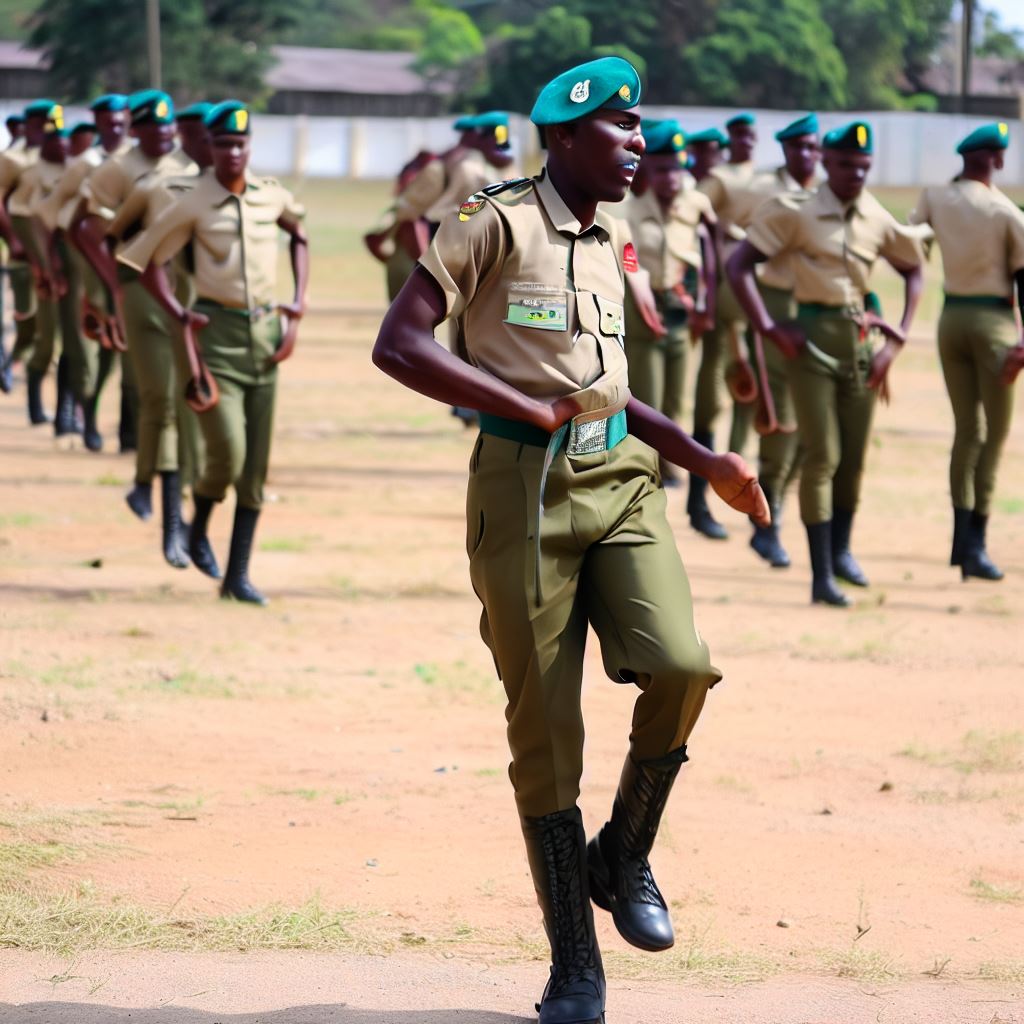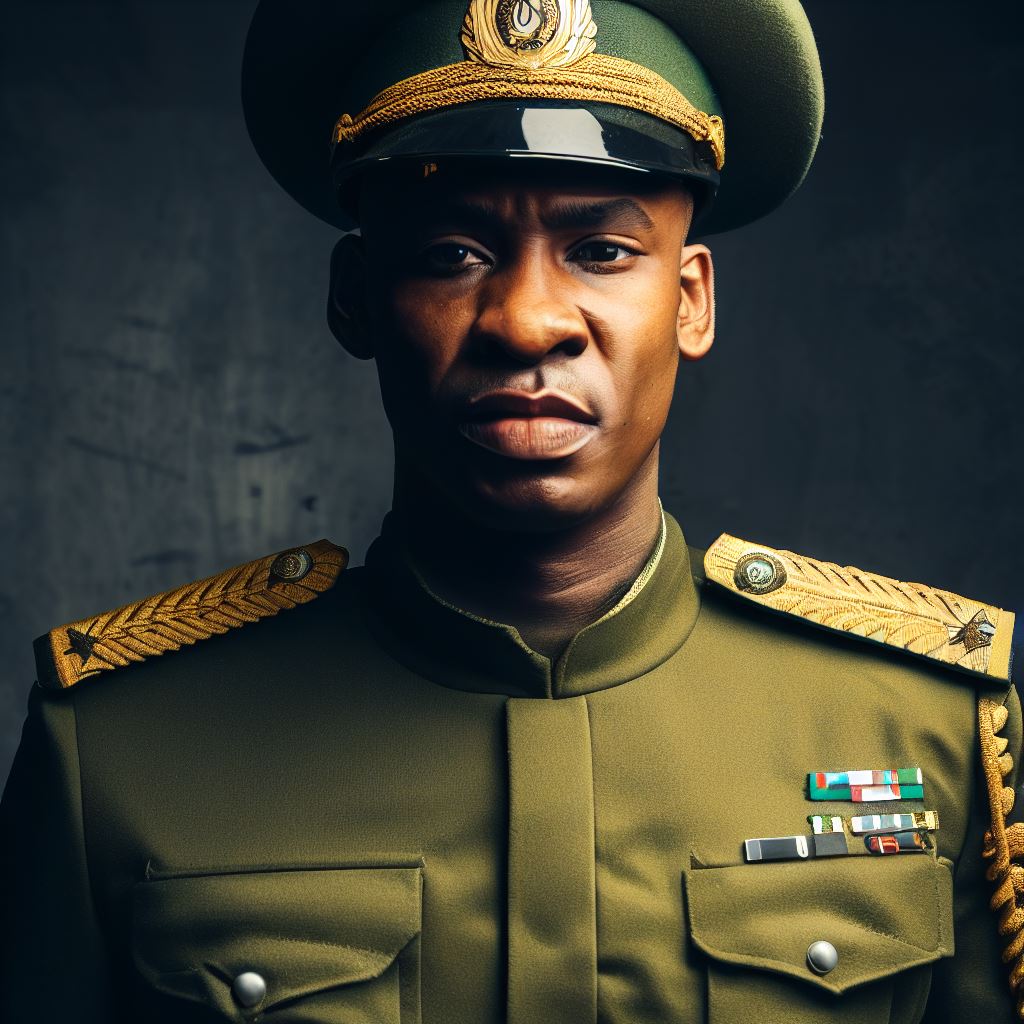Introduction
Military Officer Ranks in Nigeria plays a crucial role in maintaining national security and defending the country.
Understanding military officer ranks in Nigeria is important for various reasons.
The Nigerian military is responsible for safeguarding the nation’s territorial integrity and maintaining internal security.
Comprising the Nigerian Army, Nigerian Navy, and Nigerian Air Force, the military plays a vital role in protecting the country against external threats and ensuring peace within its borders.
Knowing military officer ranks in Nigeria is essential to comprehend the hierarchy and command structure within the armed forces.
It allows for a better understanding of the chain of command, ensuring effective communication and coordination between officers of different ranks.
This knowledge is crucial, particularly in emergency situations and during military operations, as it enables efficient decision-making and execution of strategies.
Furthermore, recognizing military officer ranks is important for civilians to show respect and understanding towards those serving in the armed forces.
It helps establish a sense of appreciation for the sacrifices and dedication of military personnel, ensuring they receive the respect and support they deserve.
Moreover, understanding military ranks can aid in proper etiquette and protocol, especially in formal settings and official engagements.
It allows civilians to address military personnel correctly, giving due recognition to their rank and position.
Knowing military officer ranks in Nigeria is of utmost importance.
It facilitates effective communication, demonstrates respect for the armed forces, and ensures proper etiquette and protocol are observed in various situations.
Nigerian Army Officer Ranks
Commissioned officers
- General : The highest rank in the Nigerian Army, responsible for strategic planning and decision-making.
- Lieutenant General : Assists the General and holds a crucial role in commanding and organizing army troops.
- Major General : Commands a division and supervises various military units.
- Brigadier General : Holds important positions in headquarters and commands brigades.
- Colonel : Responsible for leading regiments and coordinating operations in the field.
- Lieutenant Colonel : Assists higher-ranking officers in planning and executing military operations.
- Major : Leads military units, usually known as battalions, and ensures their efficient functioning.
- Captain : Commands companies and performs administrative duties within the army.
- Lieutenant : Holds command or staff positions and assists higher-ranking officers in their responsibilities.
- Second Lieutenant : Newly commissioned officer responsible for learning and gaining practical experience.
Warrant officers
Warrant officers hold specialized positions and possess expertise in specific fields.
Nigeria’s army officer ranks demonstrate the hierarchical structure of the military institution.
Transform Your Career in Nigeria
Discover unmatched expertise with our personalized Career Consulting service. Navigate Nigeria’s job market with a strategy tailored just for you.
Get StartedCommissioned officers are the highest-ranking personnel, possessing the authority to command and make crucial decisions in various military operations.
This section highlights each officer rank, outlining their roles and responsibilities.
At the top of the hierarchy is the General, whose primary role is strategic planning and decision-making.
The General holds the highest level of authority within the Nigerian Army and plays a vital role in shaping the direction of military operations.
Assisting the General is the Lieutenant General, responsible for commanding and organizing army troops to ensure efficient operations on the ground.
The Major General, another high-ranking officer, commands divisions and supervises various military units. Their expertise and experience are crucial in maintaining discipline and efficiency within the army.
Assisting the Colonel is the Lieutenant Colonel, responsible for assisting higher-ranking officers and ensuring the execution of military operations.
Majors, on the other hand, lead military units, commonly referred to as battalions, and ensure their efficient functioning.
Their role involves maintaining discipline, providing guidance to troops, and reporting to higher-ranking officers.
Captains, one rank below majors, command companies and perform administrative duties critical to the smooth functioning of the army.
Lieutenants hold command or staff positions within the army and assist higher-ranking officers in fulfilling their responsibilities.
Their role involves collaborating with officers of higher ranks and overseeing the execution of tasks.
Second Lieutenants, at the bottom of the commissioned officer rank, are newly commissioned officers whose main focus is to learn and gain practical experience.
Apart from commissioned officers, the Nigerian Army also has warrant officers who possess specialized knowledge in specific fields.
Read: Paths to Becoming a Military Officer in Nigeria
Nigerian Air Force Officer Ranks
Commissioned officers
- Marshal of the Air Force
- Air Chief Marshal
- Air Marshal
- Air Vice-Marshal
- Air Commodore
- Group Captain
- Wing Commander
- Squadron Leader
- Flight Lieutenant
- Flying Officer
- Pilot Officer
Direct non-commissioned officers
Now, let’s take a closer look at the officer ranks within the Nigerian Air Force, which is one of the branches of the Nigerian Armed Forces.
The President of Nigeria typically commissions individuals, granting them ranks in the Nigerian Air Force. Here are the various ranks.:
- Marshal of the Air Force: The Nigerian Air Force reserves the highest rank exclusively for the Chief of the Air Staff.
- Air Chief Marshal: This rank is the second-highest rank in the Nigerian Air Force and is bestowed upon the Chief of the Air Staff.
- Air Marshal: Air Marshals are senior officers in the Nigerian Air Force who hold important command or administrative positions.
- Air Vice-Marshal: This rank is inferior to an Air Marshal but superior to an Air Commodore. Air Vice-Marshals play significant roles in the Air Force.
- Air Commodore: Air Commodores are senior commissioned officers who have shown exceptional leadership and command capabilities.
- Group Captain: Group Captains are senior officers who often hold important operational or administrative positions within the Nigerian Air Force.
- Wing Commander: Wing Commanders are officers who have demonstrated expertise in their fields and are responsible for commanding operational units.
- Squadron Leader: Squadron Leaders are senior officers who typically command a squadron, which is a military unit comprising aircraft.
- Flight Lieutenant: Flight Lieutenants are junior commissioned officers who have gained considerable experience in flying aircraft.
- Flying Officer: Flying Officers are newly commissioned officers who are in the early stages of their career in the Nigerian Air Force.
- Pilot Officer: Pilot Officers are at the lowest rank among commissioned officers. They are still undergoing training and gaining experience.
- Direct non-commissioned officers: The Nigerian Air Force appoints non-commissioned officers based on expertise and experience, not commissioned ranks.
Read: Military Officer Ranks in Nigeria: A Comprehensive List
Nigerian Navy Officer Ranks
Commissioned officers
- Admiral of the Fleet : The highest ranking officer in the Nigerian Navy.
- Admiral : The second highest ranking officer in the Nigerian Navy.
- Vice-Admiral : A senior naval officer who assists and reports to the Admiral.
- Rear Admiral : A high-ranking naval officer responsible for overseeing naval operations.
- Commodore : A senior naval officer who commands a group of ships.
- Captain : An officer in command of a naval vessel or a shore establishment.
- Commander : A senior commissioned officer responsible for leading a naval unit.
- Lieutenant Commander : A junior commissioned officer with significant leadership responsibilities.
- Lieutenant : A mid-level commissioned officer who holds various roles within the Navy.
- Sub-Lieutenant : A junior commissioned officer who has recently graduated from the Nigerian Naval Academy.
Warrant officers
The Nigerian Navy, like other branches of the Nigerian Armed Forces, has a well-defined structure of officer ranks.
These ranks are bestowed upon individuals based on their experience, training, and qualifications. In this section, we will explore the various officer ranks within the Nigerian Navy.
Commissioned officers hold leadership positions within the Nigerian Navy and are appointed through the Commissioned Officer Training Course at the Nigerian Naval Academy.
The highest-ranking officer in the Nigerian Navy is the Admiral of the Fleet, who holds the prestigious position of leadership and commands the entire naval force. This rank is the pinnacle of achievement in the Nigerian Navy.
The Admiral of the Fleet outranks the Admiral, who, in turn, holds senior responsibilities in the Navy, followed by the Vice-Admiral.
The role of a Vice-Admiral is to support and assist the Admiral in making strategic decisions and overseeing operations.
Publish Your Professional Profile, Business or Brand
Showcase your expertise, gain trust, and boost visibility instantly on Professions.ng.
Publish NowRear Admirals are next in the hierarchy. They are responsible for overseeing and managing naval operations and ensuring the smooth functioning of their assigned units.
Commodores, on the other hand, command a group of ships and are responsible for their operational readiness.
Captains hold commanding positions, either on a naval vessel or at a shore establishment. They have full authority and responsibility for the operational performance, safety, and welfare of their personnel.
Commanders, Lieutenant Commanders, and Lieutenants also hold key leadership roles within the Nigerian Navy, each with increasing responsibilities and duties.
Sub-Lieutenants are junior officers who have recently graduated from the Nigerian Naval Academy.
They undergo further training and gain practical experience to prepare them for higher-ranking positions in the future.
Read: Benefits and Challenges: Military Service in Nigeria

Comparison of Officer Ranks across the Nigerian Military
Distinction between Army, Air Force, and Navy ranks
In the Nigerian military, there are three distinct branches – the Army, Air Force, and Navy. Each branch has its unique officer ranks, which signify the command structure and authority within that specific branch.
Army Ranks
The officer ranks in the Nigerian Army are as follows:
- Second Lieutenant
- Lieutenant
- Captain
- Major
- Lieutenant Colonel
- Colonel
- Brigadier General
- Major General
- Lieutenant General
- General
The highest-ranking officer in the Nigerian Army holds the title of the Chief of Army Staff.
Air Force Ranks
The officer ranks in the Nigerian Air Force are slightly different from the Army. They are as follows:
- Pilot Officer
- Flying Officer
- Flight Lieutenant
- Squadron Leader
- Wing Commander
- Group Captain
- Air Commodore
- Air Vice-Marshal
- Air Marshal
- Air Chief Marshal
The highest-ranking officer in the Nigerian Air Force is the Chief of the Air Staff.
Navy Ranks
The officer ranks in the Nigerian Navy also differ from the Army and Air Force. They are as follows:
- Midshipman
- Sub-Lieutenant
- Lieutenant
- Lieutenant Commander
- Commander
- Captain
- Commodore
- Rear Admiral
- Vice Admiral
- Admiral of the Fleet
The highest-ranking officer in the Nigerian Navy is the Chief of the Naval Staff.
Similarities and overlapping ranks
While each branch of the Nigerian military has its unique officer ranks, there are some similarities and overlapping ranks.
Second Lieutenant
The rank of Second Lieutenant is common to all three branches of the military, although the specific responsibilities may vary.
Lieutenant
Similarly, the rank of Lieutenant can be found in all three branches, signifying an officer in a higher position than a Second Lieutenant.
Captain
The rank of Captain is another common rank shared by the Army, Air Force, and Navy, albeit with different responsibilities within each branch.
Major
The rank of Major is another overlapping rank across the Nigerian military branches, designating officers with significant command responsibilities.
Roles and responsibilities at each rank
The roles and responsibilities assigned to officers within each rank vary, reflecting the progressive development of leadership skills and experience.
Junior Ranks
At the junior ranks, officers are generally responsible for the direct supervision of subordinates and executing orders from higher-ranking officers.
Middle Ranks
In the middle ranks, officers are entrusted with broader responsibilities that include planning and executing military operations.
Senior Ranks
Senior-ranking officers take on command roles, overseeing entire units or departments and formulating military strategies and policies.
High Command
Officers in the highest ranks assume command of entire branches and contribute to the overall direction and management of the Nigerian military.
The Nigerian military consists of three branches with distinct officer ranks. While there are some overlapping ranks, each branch maintains its unique command structure.
The roles and responsibilities of officers evolve as they progress through the ranks, reflecting their increasing leadership capabilities.
Read: Military vs. Civilian Bomb Disposal in Nigeria
Conclusion
Understanding military officer ranks in Nigeria is crucial for both civilians and aspiring military personnel.
It allows for better appreciation and comprehension of the Nigerian military structure.
By understanding the ranks, civilians can show respect and recognize the contributions of military personnel.
It also facilitates effective communication and cooperation between civilians and military personnel.
Further research on military officer ranks can provide a deep insight into the Nigerian military’s hierarchy.
It can help individuals aspiring to join the military to prepare and understand career progression opportunities.
Researching the roles and responsibilities associated with each rank enhances understanding and appreciation.
It fosters a sense of national pride and respect for those who protect and serve the nation.
It is important to recognize the sacrifices and commitment of Nigerian military personnel.
By respecting the military, citizens contribute to the country’s overall security and stability.
Encouragement is given to readers to delve deeper into researching military officer ranks in Nigeria.
Books, online resources, and personal interactions can provide valuable information and insights.
The more one learns, the better equipped they are to engage in informed discussions about the Nigerian military.
Publish Your Professional Profile, Business or Brand
Showcase your expertise, gain trust, and boost visibility instantly on Professions.ng.
Publish NowResearching military officer ranks showcases a genuine interest in Nigeria’s military and its historical significance.
Understanding the ranks can also act as a stepping stone towards understanding military strategies and operations.
Fostering respect and research on military officer ranks in Nigeria is crucial for all citizens.
It promotes unity, appreciation, and a better understanding of the brave men and women who serve.
Let us continue to educate ourselves and honor the Nigerian military’s dedication and sacrifices.




